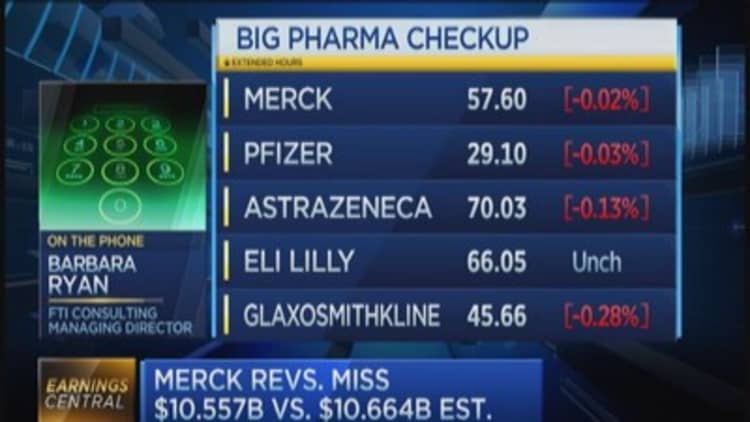
Merck reported quarterly earnings that beat analysts' expectations on Monday, but global sales dropped 4 percent amid patent expirations and a drop in sales of its hepatitis C drugs.
In addition to divesting non-core assets, selling its consumer business to Bayer and reducing expenses, Merck gave investors good news on its drug pipeline, Barbara Ryan, managing director of FTI Consulting told CNBC's "."
Among the advances were approval for oncology agent Keytruda and insomnia drug Belsomra, which Ryan chalked up to Merck's commitment to research and modest growth in research and development spending under CEO Ken Frazier, even as rivals such as Pfizer scale back.
"What we see now is the fruits of those labors coming through with these announcements on the new product announcements," said Ryan.
Following the report, the drug giant's shares were lower in premarket trade. (Click here to track its shares.)
The company's third-quarter earnings fell to 90 cents per share from 92 cents a share in the year-earlier period.
Read MoreEarnings picture in the energy sector looks grim
Global sales slipped to $10.56 billion from $11.03 billion a year ago.
Analysts had expected Merck to post earnings of 88 cents a share on revenue of $10.67 billion.
The company adjusted its guidance for full-year earnings excluding items to $3.46 to $3.50 a share, on revenue of $42.4 billion to $42.8 billion.
Known as MSD outside the United States and Canada, Merck operates in more than 140 countries and employed about 73,000 people, as of June 30, 2014. The New Jersey-based firm offers products for health professionals, consumers and animal care, with retail brands such as Dr. Scholl's and Coppertone.
Read MoreFord earnings beats, helped by truck, SUV sales
Earlier this month, the pharmaceutical firm completed the $14.2 billion sale of its consumer care business to Bayer, which will take over the existing over-the-counter business and global trademark and prescription rights for Claritin and Afrin.
The two companies also agreed to collaborate on worldwide development and commercialization of certain products. The firms will equally share certain costs and net sales for all products and candidates included in the collaboration.
Ryan said the drug industry has been doing phenomenally well and companies' pipelines were on the rebound since Merck's pain medication Vioxx was pulled off the market 10 years ago after it was linked to increased risk of heart attack.
"Certainly what's propelling the group is not only the restructuring of the industry, consolidation, but also the pipelines are improving, and I think we got a bit of that news in Merck's results this morning," said Ryan.
Also in October, federal prosecutors in New York charged a former Merck employee with conspiracy to commit fraud for tipping a contact about potential mergers, including a Merck takeover of Idenix Pharmaceuticals, ahead of a public announcement in June.
—CNBC's Evelyn Cheng and Tom DiChristopher and Reuters contributed to this report.

